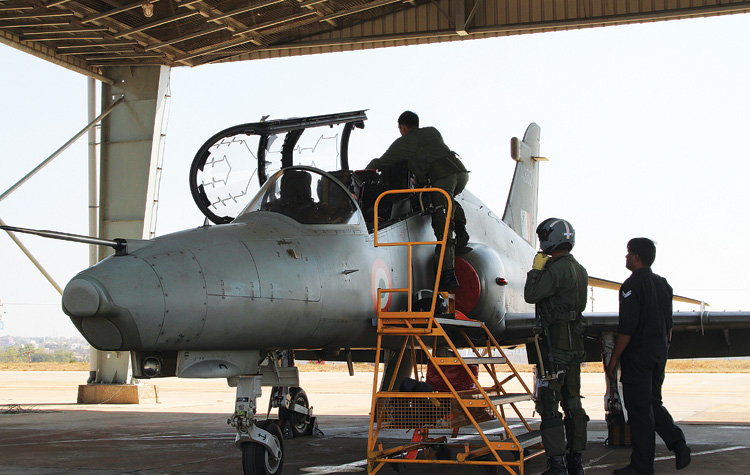INDIAN ARMED FORCES CHIEFS ON OUR RELENTLESS AND FOCUSED PUBLISHING EFFORTS

The insightful articles, inspiring narrations and analytical perspectives presented by the Editorial Team, establish an alluring connect with the reader. My compliments and best wishes to SP Guide Publications.

"Over the past 60 years, the growth of SP Guide Publications has mirrored the rising stature of Indian Navy. Its well-researched and informative magazines on Defence and Aerospace sector have served to shape an educated opinion of our military personnel, policy makers and the public alike. I wish SP's Publication team continued success, fair winds and following seas in all future endeavour!"

Since, its inception in 1964, SP Guide Publications has consistently demonstrated commitment to high-quality journalism in the aerospace and defence sectors, earning a well-deserved reputation as Asia's largest media house in this domain. I wish SP Guide Publications continued success in its pursuit of excellence.
- The layered Air Defence systems that worked superbly, the key element of Operation Sindoor
- Operation Sindoor | Day 2 DGMOs Briefing
- Operation Sindoor: Resolute yet Restrained
- India's Operation Sindoor Sends a Clear Message to Terror and the World – ‘ZERO TOLERANCE’
- Japan and India set forth a defence cooperation consultancy framework, talks on tank and jet engines
‘The right collaboration can accelerate India’s defence programmes and build strategic capability’
Rolls-Royce is well-positioned to support such a collaboration with its ecosystem of strategic local partnerships, strong supply chain, rich talent pool, digital solutions and service delivery capabilities in India
 | Alex Zino, Executive Vice President Business Development & Future Programmes, Rolls-Royce |

Indigenisation in defence is critical for achieving self-reliance and developing capabilities within the country. India has already taken several steps towards the creation of a domestic defence manufacturing ecosystem with the support of the private sector and global partners.
The evolution of its indigenisation policy towards codevelopment and co-production in partnership with global companies has also provided the much-needed impetus to the growth of the local defence industry. With geopolitical and economic crises affecting world stability, a robust and self-reliant defence ecosystem will help develop India’s strategic capability, boost manufacturing and exports as well as contribute to economic and security resilience.
While efforts in this direction have been significant, India can accelerate its progression towards critical technology development and ownership through programmes that will lead to the creation of technological capabilities within the country. This will ensure long-term benefits and opportunities for further customisation and exports.
The Indian government’s goal of achieving true self-reliance will actually be realised through end-to-end capability creation and ownership of intellectual property (IP). Here, a mutually rewarding partnership with a willing ally could prove beneficial.
The United Kingdom is one such country that is ready to go one step further, enabling not only technology transfer but the co-creation of capabilities in-country. The UK industries, with the support of the UK government, have a proven history of partnerships with other nations that have resulted in successful programmes. These include the EJ200 (developed with Germany, Spain and Italy) and the ongoing next-generation Global Combat Air Programme (being developed in collaboration with Italy and Japan), wherein Rolls-Royce has played a critical role in the success of the collaboration. With a proven legacy of technology development collaborations and demonstrated technical know-how, the UK can complement India’s own technical and resource strengths and capabilities for joint development. As the two countries have pledged their commitment to greater cooperation in defence and security, it is an opportune time to build on the relationship.
Rolls-Royce is well-positioned to support such a collaboration with its ecosystem of strategic local partnerships, strong supply chain, rich talent pool, digital solutions and service delivery capabilities in India. We have been serving the Indian armed forces for nine decades and are committed to strengthening this relationship. Rolls-Royce’s India presence is backed by over 100 years’ experience in engine design, development and manufacturing, particularly in the complex, gas turbine-based aero-engine segment. All these factors make us a potentially game-changing partner for India’s combat engine programme. We are offering a co-development model that leads to IP ownership in India, naturally followed by co-production and co-manufacturing opportunities. Such co-development will result in the creation of capability in-country to indigenise defence technologies.
India’s defence industry is at a transformational tipping point. Aimed at rapid indigenisation, the government’s efforts have been directed towards revamping the manufacturing ecosystem with a focus on technological innovation, enhancing capacity and building a robust supply chain to meet both domestic and international demand. At this point, a strategic collaboration that results in both technology and capability creation would accelerate India’s goal of becoming a leading global defence hub.





